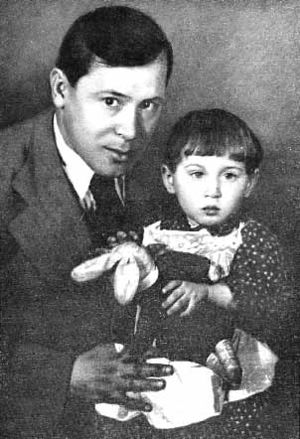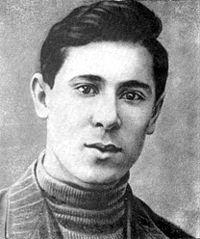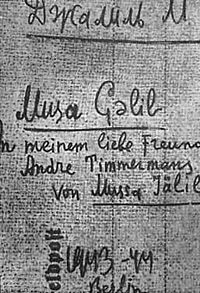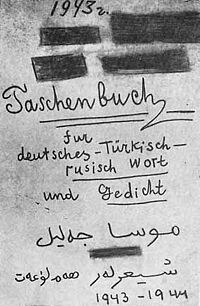- Musa Cälil
-
Mussa Jalil
موسا ﺟﮫليل
Musa Çəlil
Муса Җәлил
Musa Cälil
Musa Cälil with his daughter ÇulpanBorn February 15, 1906
Mustafino, Orenburg Guberniya, Russian EmpireDied August 25, 1944 (aged 38)
Plötzensee, GermanyOccupation Poet, playwright, journalist, editor, resistance fighter Nationality Tatar Period Interwar period Spouse(s) Äminä Zalyalova Children Çulpan Zalyalova Musa Cälil[1] (pronounced [muˈsɑ ʑæˈlil]; Arabic: موسا ﺟﮫليل; Jaŋalif: Musa Çəlil; Cyrillic: Муса Җәлил; full name: Musa Mostafa ulı Cälilev, Cyrillic: Муса Мостафа улы Җәлилев; Russian: Муса Джалиль, Муса Мустафович Залялов, Musa Dzhalil, Musa Mustafovich Zalyalov, also anglicized as Mussa Jalil [muˈsɑ dʒæˈlil]; February 15, 1906 – August 25, 1944) was a Soviet Tatar poet and resistance fighter. He is the only poet of the Soviet Union who was simultaneously awarded the Hero of the Soviet Union award for his resistance fighting, and the Lenin Prize for authoring The Moabit Notebooks; both the awards were awarded to him posthumously.[2]
Contents
Biography
Early life
Musa Cälil was born in Mustafino, a village in the Orenburg guberniya in the family of Junkman. He graduated Xösäyeniä[3] madrassah in Orenburg. His first published works were revolutionary verses. The Turkic poetic tradition of aruz traced in Cälil's early works, which attributed to Ghisyanism, a style of revolt, found in the Tatar poetry of early 1920s. In 1919, he entered the underground Komsomol cell of Orenburg, which was under the control Whites that time. Then, Musa participated in the Russian Civil War against pro-White gangs, but due to his nonage he didn't fight at the front, but in a Red Army unit. In 1920, Cälil returned to his native village, establishing the pro-Communist youth organization The Red Flower there. He also became a Komsomol activist in Mustafino. He represented his village at the governorate Komsomol conference.[4]
Literary life
In 1920, the Tatar ASSR was established and Kazan became its capital. In 1922, Musa, along with other Tatar poets[who?], moved to Kazan. During this time, verses that he wrote include "The Red Host", "The Red Holyday", "The Red Hero", "The Red Way", "The Red Force", and "The Red Banner". In Kazan, Cälil worked as copyist for the Qızıl Tatarstan newspaper and studied at rabfak of the Oriental Pedagogical Institute. He became acquainted with Tatar poets such as Qawi Näcmi, Hadi Taqtaş, and Ğädel Qutuy. In 1924, he became a member of the October literary society, backing Proletkult. Since that year, his poetry departed from Ghisyanism and aruz and turned to the Tatar folk verse. His first collection of verses, Barabız (We are going) was published in 1925. One concept that the verses dealt with was pre-revolutionary life. [4]
During 1925 and 1926, Cälil became an instructor of Orsk uyezd Komsomol cell, where he visited Tatar and Kazakh auls, agitating for Komsomol there. In 1926, he became the member of Orenburg governorate Komsomol committee. In 1927, Musa moved to Moscow, where he combined his study in the Moscow State University and job in Tatar-Bashkir section of the Central Committee of Komsomol. Cälil joined the Communist Party of the Soviet Union in 1929, which was the same year that his second collection, İptäşkä (i.e. To the Comrade; Jaŋalif: Iptəşkə) was published. Living in Moscow, Cälil met Russian poets Zharov, Bezymensky, and Svetlov; Cälil also attended Vladimir Mayakovsky's performances. He entered the Moscow Association of Proletarian Writers; he became its third secretary and a leader of its Tatar section. By the end of 1920s, lyricism appeared in Cälil's poetry.[4]
In 1931, Cälil graduated from the literature faculty of Moscow University. Until 1932, he was a chief editor of the Tatar children's magazine Keckenə iptəşlər, which was later renamed to Oktəbr Balasь (Little Octobrist). Then, he managed the section of literature and art in the central Tatar newspaper Kommunist. In 1934, Musa Cälil published two collections. The first of them, The Millions, Decorated with Orders was devoted mostly to youth and Komsomol, whereas in the second, Verses and Poems, was a general compilation of his writing. However, many[weasel words] of his lyrical poems weren't published due to being at conflict with Stalinism.[4]
In 1935, the first Russian translations of his poems were published. During the 1930s, Cälil also translated to the Tatar language writings of poets of the USSR peoples, such as Shota Rustaveli, Taras Shevchenko, Pushkin, Nekrasov, Mayakovsky and Lebedev-Kumach. In the late 1930s, he tended to write epic poems, such as The Director and the Sun (1935), Cihan (1935–1938), and The Postman (1938). As a playwright of the Tatar State Opera, he wrote four librettos for Tatar operas, one of which is Altınçäç (Golden Hair Maiden) of Näcip Cihanov.[4] In 1939 and 1940, he served as the chairman of the Tatar ASSR Union of Writers.[5]
During World War II
After Nazi Germany's invasion of the Soviet Union in June 1941, Cälil volunteered for the Red Army. Graduating political commissar courses, he arrived at the Volkhov Front and became a war correspondent in the Otvaga newspaper. Cälil also wrote verse, which was at first patriotic but later evolving into lyricism concerning war and people experiencing war.
In June 1942, during the Lyuban Offensive Operation, Cälil's unit was encircled; when his unit tried to run a blockade he became seriously wounded, shell-shocked, and captured. After months[when?] in concentration camps for Soviet prisoners of war, including Stalag-340 in Daugavpils, Latvia[6] and Spandau, Cälil was transferred to Dęblin, a fortified stronghold in Poland. There, the Nazis were assembling prisoners of Idel-Ural and Eastern nationalities in the camp. Cälil responded by forming a resistance group.
In late 1942, the Nazis started forming what they called "national legions". Among others, the Idel-Ural legion was formed in Jedlina, Poland, consisting of prisoners of war belonging to the nations of the Volga basin. Since the majority of the legion were Volga Tatars, the Germans usually called it the Volga-Tatar legion. The Nazis tried preparing the legionnaires for action against the Soviet Army in a chauvinistic and anti-Soviet fashion. Cälil joined the Wehrmacht propaganda unit for the legion under the false name of Gumeroff. Cälil's group set out to wreck the Nazi plans, to convince the men to use the weapons they would be supplied with against the Nazis themselves. The members of the resistance group infiltrated the editorial board of the Idel-Ural newspaper the German command produced, and printed and circulated anti-fascist leaflets among the legionnaires into esoteric action groups consisting of five men each. The first battalion of the Volga-Tatar legion that was sent to the Eastern front mutinied, shot all the German officers there, and defected to the Soviet partisans in Belarus.
Capture and death
In August 1943, Nazi spies tracked down the resistance group. Musa Cälil and most[weasel words] of his militant comrades were seized. There followed days and nights consisted of Cälil and his group receiving interrogations and torture. The Gestapo broke Cälil's left arm and injured his kidneys. His body contained welts from being beaten with an electric cord and rubber hose. His fingers were swollen and would not bend. While imprisoned, he wrote poetry against Nazism.[2]
On August 10, 1943, he was arrested with his comrades and sent to Moabit Prison in Berlin. He sat in a cell with Belgian patriot and resistance fighter André Timmermans, and also with one Polish prisoner. Cälil studied German in prison to communicate with the cellmates. In this prison, he compiled verses composed in the prison into self-made notebooks. He and his group of 12 were sentenced to death on February 12, 1944 and guillotined at Plötzensee Prison, Berlin, on August 25. His body was never recovered afterwards.
Legacy
 Monument near the Kazan Kremlin, opened in 1983.
Monument near the Kazan Kremlin, opened in 1983.
On April 23, 1945, the 79th Infantry Corps of the Soviet Army, that was advancing on the Reichstag, took up positions along the Berlin streets of Ratenowerstraße and Turnstraße. A soldier who paused there before the following attack noticed several lines in Russian on one of the clean pages of a book nearby: "I am the Tatar poet Musa Cälil, held in Moabit prison as a prisoner of war against whom political charges have been preferred, and will most likely be shot soon. If some Russian finds this note, convey my regards to my writer friends in Moscow and break the news to my family". The soldiers sent the page to the Union of Writers in Moscow. That was the first time Russia heard of Musa Cälil's fate.[2]
Cälil's first notebook was preserved by the Tatars Ğabbas Şäripov and then Niğmät Teregulov, both of whom later died in Stalin's camps. Şäripov was also imprisoned in Moabit and received Cälil's and Abdulla Aliş's writings when the prison guards hid from bombing. To preserve the writings, Cälil's group fenced him off.[7] The second notebook was preserved by the Belgian cellmate André Timmermans. Those notebooks were passed to the Tatar ASSR Union of Writers in 1946 and 1947 correspondingly. They were published as two books under the title Moabit Däftäre (The Moabit Notebook). Cälil's widow Äminä Zalyalova gave the originals to the National Museum of Tatarstan for safekeeping.
One notebook was brought to the Soviet embassy in Rome by the ethnically Tatar Turkish citizen Kazim Mirşan in 1946. However, this notebook was lost in the archives of SMERSH, and pursuits for it since 1979 have had no results.[citation needed]
Rehabilitation and recognition
 A 1959 Musa Cälil U.S.S.R. postage stamp.
A 1959 Musa Cälil U.S.S.R. postage stamp.
In 1946, MGB opened a file on Musa Cälil branding him as a traitor. In April 1947, his name was included in the list of wanted "dangerous criminals".
Then Tatar writers and the Tatarstan department of state security proved Cälil's underground work against the Nazis and his death. In 1953, The Moabit Notebooks were published in Kazan[5] and the Russian translation also was published in Literaturnaya Gazeta, owing to its editor, Konstantin Simonov. Musa Cälil was awarded the star of the Hero of the Soviet Union in 1956 and Literature Lenin Prize in 1957 for The Moabit Notebooks.[2]
The monument to Musa Cälil is placed near the Kazan Kremlin; the museum in his flat was opened in Kazan in 1983.[5] His poetry was popularized in the Soviet Union and the Warsaw Pact countries.
Soviet Tatar composer Nazib Zhiganov wrote an "opera-poem" Dzhalil based on the life of Cälil. This was premiered in Tatar in Kazan in 1957, and later recorded by conductor Boris Khaykin for Moscow radio.
A minor planet 3082 Dzhalil discovered by Soviet astronomer Tamara Mikhailovna Smirnova in 1972 is named after him.[8]
Writings
1929 İptäşkä ("To the Comrade") 1934 Ordenlı millionnar ("The Millions Decorated with Orders") 1935-1941 Altınçäç 1940 Xat taşuçı ("The Postman") İldar (opera libretto) 1943 Tupçı antı ("The Oath of the Artilleryman") Footnotes
- ^ Also transliterated as Mussa Jalil, Mussa Djalil, Musa Dzhalil, Mussa Dshalil, Mussa Jälil, Musa Celil, Moussa Jalíl
- ^ a b c d Mussa Jalil. Selected poems. Poetry of Truth and Passion. Rafael Mustafin, translated by Lydia Kmetyuk. Moscow, Progress Publishers, 1981
- ^ co-spelled Husainiya
- ^ a b c d e (Russian) Rafael Mustafin Biography Dzhalil kitap.net.ru. Retrieved on 2010-07-22.
- ^ a b c (Tatar) "Муса Җәлил". Tatar Encyclopedia. Kazan: Tatarstan Republic Academy of Sciences Institution of the Tatar Encyclopaedia. 2002.
- ^ Федеральное агентство по культуре и кинематографии - Муса Джалиль
- ^ (Russian) Мусса Джалиль. Моабитские тетради. Татарское книжное издательство. Казань 1963. Составитель - Г. Кашшаф.
- ^ Schmadel, Lutz D. (2003). Dictionary of Minor Planet Names, page 254. Springer-VerlagBerlin Heidelberg New York. ISBN 3-540-00238-3. http://books.google.com/books?id=KWrB1jPCa8AC&pg=PA254&dq=3082+Dzhalil&hl=ru&cd=3#v=onepage&q=3082%20Dzhalil&f=false.
External links
- Musa Cälil's poetry
- (Tatar) Musa Cälil's poetry
- (Russian) Images from Cälil's archive
Categories:- Executions at Plötzensee Prison
- People condemned by Nazi courts
- People executed by decapitation
- Soviet prisoners of war
- Resistance members killed by Nazi Germany
- World War II resistance members
- Tatar poets
- Translators from Russian
- Soviet poets
- 1906 births
- 1944 deaths
- War correspondents
- Soviet people of World War II
- Soviet people executed abroad
- Heroes of the Soviet Union
- Memoirs of imprisonment
- Translators to Tatar
Wikimedia Foundation. 2010.



